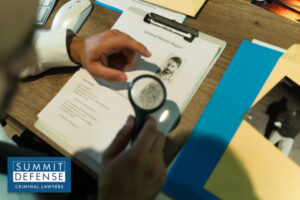 A DUI charge can be overwhelming. It can impact your driving privileges, raise your insurance costs, and even affect your job. But in some cases, a DUI case can be dismissed, not because the person didn’t drink, but because something went wrong during the arrest process or investigation.
A DUI charge can be overwhelming. It can impact your driving privileges, raise your insurance costs, and even affect your job. But in some cases, a DUI case can be dismissed, not because the person didn’t drink, but because something went wrong during the arrest process or investigation.
Summit Defense Criminal Lawyers understands how much is at stake. Our team looks closely at every part of your case to find weak spots in the evidence gathered, from how the arresting officer handled the stop to whether the chemical tests were done right.
If we find that law enforcement failed to follow the rules, we use that to build a strong defense. Sometimes, the issue is serious enough to get the entire DUI charge thrown out. This type of result is known as a DUI dismissal based on a legal technicality.
What Does “Dismissed on a Technicality” Mean?
When a DUI case is “dismissed on a technicality,” it means the court ends the case not because the person proved they were sober, but because something went wrong in how the case was handled. These problems are usually tied to errors made by law enforcement officers or the court, and they raise questions about fairness or the truthfulness of the evidence presented.
For example, the police officer might not have had reasonable suspicion to make the traffic stop, or maybe the chemical test results were handled incorrectly. In DUI cases, even small mistakes can matter. That’s because a person has legal rights during every step of the stop, arrest, and investigation.
If those rights were violated, like failing to read Miranda warnings or using an uncalibrated breathalyzer, the defense can ask the judge to dismiss the case. A skilled defense attorney knows how to spot these issues and bring them up in court. When done correctly, these legal moves can weaken the prosecution's case enough to win a dismissal.
How Technicalities Can Affect DUI Cases
Technical errors can change the outcome of a DUI case. If the law enforcement officer made a mistake while collecting evidence or didn’t follow legal rules during your DUI arrest, your defense attorney can ask the court to throw out that part of the evidence.
Without strong proof, the judge may decide the case can’t move forward. That can mean a full DUI dismissal, or a better chance of a reduced charge or lighter penalty.
Dismissal vs. Reduction vs. Acquittal
| Outcome | What It Means |
|---|---|
| Dismissal | The court drops the DUI charges, often due to legal or procedural problems. |
| Reduction | Your DUI charge is lowered to a less serious offense, such as reckless driving. |
| Acquittal | You went to trial and were found not guilty by a judge or jury. |
Common Technicalities That Can Lead to Dismissal
 Some DUI cases fall apart not because the driver was innocent, but because something went wrong during the stop, testing, or arrest that violated the law. These legal errors can give your defense attorney a reason to ask the judge to throw the case out entirely.
Some DUI cases fall apart not because the driver was innocent, but because something went wrong during the stop, testing, or arrest that violated the law. These legal errors can give your defense attorney a reason to ask the judge to throw the case out entirely.
Illegal Traffic Stop
If a law enforcement officer stops your vehicle without reasonable suspicion of a crime or traffic violations, any evidence collected afterward may not be allowed in court. This includes field sobriety tests, breath test results, or anything you said during the stop.
If your defense attorney can prove the officer lacked reasonable suspicion, the entire case may be dismissed. Courts take illegal stops seriously, especially when your constitutional rights were violated from the very beginning of the DUI case.
Improper Field Sobriety Test Administration
The way an officer conducts field sobriety tests matters. If the law enforcement officer fails to follow proper guidelines or gives incorrect instructions, the test results may not be reliable. Some officers may not consider the driver’s medical conditions, poor lighting, or uneven roads, which can affect performance.
Your experienced DUI defense attorney can review the video or report to see if the officer failed to follow required procedures. If the test was done wrong, your lawyer can argue to have it thrown out, which could weaken the prosecution’s case significantly.
Faulty or Uncalibrated Breathalyzer
A breathalyzer machine must be properly calibrated and maintained to give accurate results. If it hasn’t been checked regularly or if it malfunctions during your test, the results may not be valid. A DUI charge based mostly on faulty chemical test results can be challenged.
Your defense attorney can request maintenance records to see if the device met legal standards. If the test results can’t be trusted, they should not be used to prove DUI. A broken or uncalibrated breathalyzer can become a key technicality in your defense.
Mishandling of Blood Samples
When a blood sample is taken, strict rules must be followed from collection to storage. If the sample is contaminated, mislabeled, or not refrigerated properly, the blood test may become unreliable. Errors in the blood test results can come from human error, improper storage, or poor lab practices.
If your defense attorney finds mistakes in how the blood tests were processed, that evidence may be excluded. Without strong test results, the judge might dismiss the DUI charge entirely.
Lack of Probable Cause for Arrest
Even if you were pulled over legally, the arresting officer must still have probable cause to arrest you for DUI. This means clear signs, like slurred speech, odor of alcohol, or poor performance on field sobriety tests.
If the law enforcement report is weak or lacks real proof, your skilled defense attorney can argue that the arrest was not legal. If the court agrees, anything that happened after the illegal DUI arrest may be thrown out, and that could result in a DUI dismissal.
Failure to Read Miranda Rights
If the police officer questions you after your arrest without reading your Miranda rights, anything you say may not be used in court. While this doesn’t always lead to dismissal, it can be essential when statements are made that are the main part of the prosecution’s case.
An experienced DUI defense attorney will review the police report to see if your rights were violated. If so, they may ask the court to suppress your statements, which could weaken the prosecution’s case and help you avoid a DUI conviction.
How a Lawyer Can Use Technicalities in Your Defense
Not all mistakes made by law enforcement are obvious, which is why having a skilled defense attorney is so important. An experienced lawyer knows where to look, what to question, and how to turn errors into strengths for your DUI case.
Reviewing Police Reports and Evidence
Your defense attorney will carefully study the police report, test results, witness testimony, and all the evidence gathered by law enforcement. This review helps find mistakes, missing information, or inconsistencies.
If the law enforcement officer failed to follow protocol, that can be used to argue that the case is unfair or based on unreliable information. Even small errors can become major points in a solid defense strategy.
Filing Motions to Suppress Evidence
When the evidence obtained by law enforcement was collected in violation of your rights, your lawyer can file a motion asking the judge to keep it out of court. This is called a motion to suppress. It often applies when constitutional rights violations happen during the stop, DUI arrest, or testing.
If that motion is granted, key chemical test results or statements you made may be excluded, which can weaken the prosecution’s case and sometimes lead to a full dismissal.
Challenging Officer Testimony
In many DUI cases, the police officer’s words carry weight. But if the witness testimony doesn’t match the facts, or if the arresting officer has a history of misconduct, your lawyer can challenge their credibility.
Any conflict between the officer’s version and the actual evidence presented can raise reasonable doubt. An experienced attorney will question the officer’s memory, honesty, and handling of the situation to help cast doubt on the prosecution's case.
Negotiating for Dismissal or Reduction
Even if a full DUI dismissal isn’t possible, a defense attorney may still use technical problems to push for reduced charges through plea bargaining. They might negotiate a lesser offense, like reckless driving, or push for lighter penalties.
If the evidence collected is weak or if the circumstances surrounding your case are unusual, this can lead to a better deal. A strong defense grounded in legal issues often puts pressure on prosecutors to settle instead of going to trial.
Factors That May Affect Dismissal
 Every DUI case is different. Even if your lawyer finds technical errors, other parts of your background or case can influence whether the court decides to dismiss the charges or not.
Every DUI case is different. Even if your lawyer finds technical errors, other parts of your background or case can influence whether the court decides to dismiss the charges or not.
Your Criminal History
A clean record helps your case. If you’ve never had a DUI conviction or any other charges, the court may be more willing to dismiss or reduce your current DUI charge. But if your criminal history includes past DUI arrests or other offenses, that could make the court less lenient.
Still, even people with a record can benefit from a strong defense that highlights law enforcement errors or legal violations.
Strength of the Prosecution’s Evidence
If the prosecution’s case is based on clear video, accurate blood test results, and consistent witness statements, it may be harder to get a dismissal. But if the evidence presented is thin or the test results are questionable, your lawyer can argue there’s not enough proof to continue.
Missing records, sloppy work by officers, or human error in lab work all give your defense attorney more room to fight back and possibly get the case thrown out.
Actions Taken After the Arrest (e.g., Rehab, Community Service)
What you do after your DUI arrest also matters. If you enroll in rehab, attend treatment programs, or complete community service, it shows the court that you take the issue seriously. These steps won’t erase the past, but they can help your attorney argue for a second chance, especially if the case also involves legal technicalities.
Judges may look more favorably upon someone who is actively trying to make amends.
What Happens If Your DUI Is Dismissed?
Getting a DUI dismissed is a major win. But it’s still important to understand what that means and what steps you might need to take next.
No Conviction on Your Record
If your case is dismissed, you won’t have a DUI conviction on your record. That means no court-ordered punishment, no probation, and no fines related to that charge. You also don’t have to report a conviction to employers or schools. However, records of the arrest may still exist, so it’s best to explore whether you can clear those, too.
Expungement Possibilities
Even after a dismissal, the DUI charge and arrest might still show up in background checks. In many cases, your lawyer can help you file to have the records sealed or expunged. Expungement means that future employers, landlords, or others won’t see the arrest on your record.
Talk to your legal professional to see if you're eligible. A clean record can make a big difference in your future opportunities.
DMV Consequences May Still Apply
Even if the court dismisses your DUI, the DMV may still take action against your driver’s license. This can include a suspension, points on your record, or a requirement to install an interlock device.
The DMV process is separate from the court, and you must request a hearing quickly after your DUI arrest. Your defense attorney can guide you through both parts of the system to help protect your driving rights.
FAQs


 When facing a DUI charge, don’t assume your case is hopeless. There are often legal issues hidden in the evidence collected, the way the arresting officer acted, or how law enforcement officers handled the stop. A single mistake can change the entire outcome.
When facing a DUI charge, don’t assume your case is hopeless. There are often legal issues hidden in the evidence collected, the way the arresting officer acted, or how law enforcement officers handled the stop. A single mistake can change the entire outcome. 